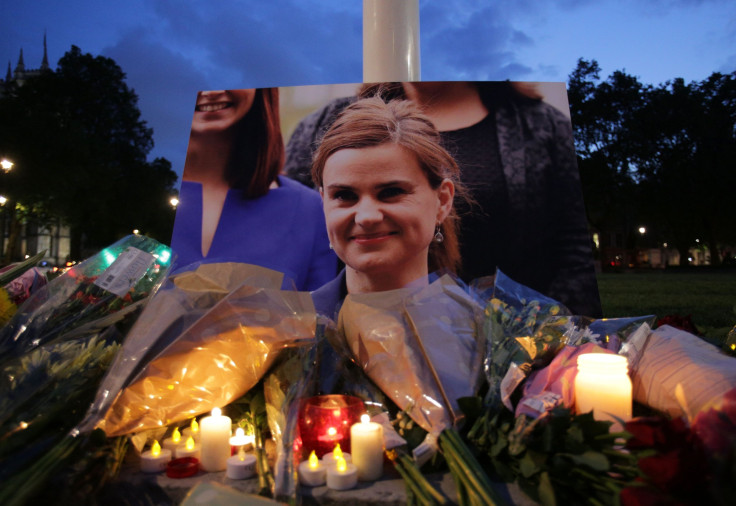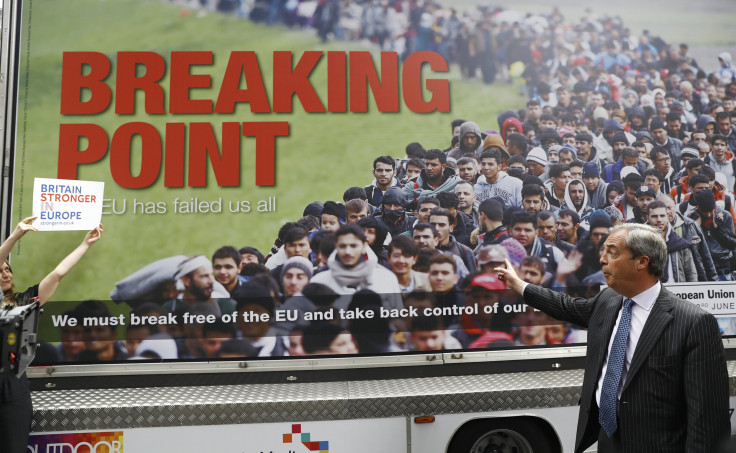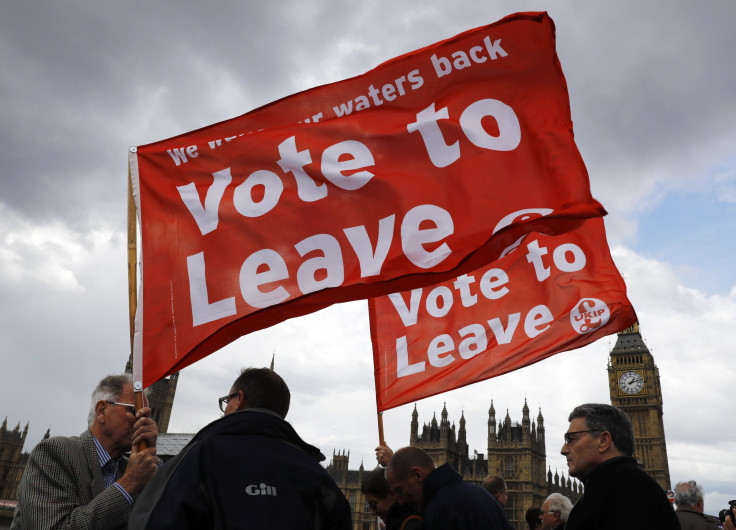Jo Cox’s Murder: American-Style Culture War Comes To UK As EU Referendum Campaign, ‘Project Fear Versus Project Anger,’ Heats Up

LONDON — All for none and none for all: If Alexandre Dumas had penned “The Three Musketeers” in 2016, his eponymous heroes’ motto might have been turned on its head. The assassination of British Labour Party politician Jo Cox on Thursday — a prominent voice in the campaign for Britain to remain in the European Union — by a man who reportedly shouted “Britain First” (the name of a far-right anti-EU party) as he repeatedly stabbed and then shot her, is a sign, critics say, American-style culture wars have come to Britain.
Hours before Cox was attacked, Nigel Farage, the head of Britain’s Euroskeptic and right-wing U.K. Independence Party (UKIP) unveiled an EU referendum poster, depicting a line of mostly nonwhite, Syrian refugees in Slovenia with the slogan “Breaking Point: the EU has failed us all.”
Scottish National Party (SNP) leader and Scottish First Minister Nicola Sturgeon condemned the poster as “disgusting” while U.K. Treasury Minister and Conservative Member of Parliament Harriet Baldwin accused the UKIP leader of “vile xenophobia.”
Following the announcement that Cox had died, supporters of the “remain” campaign were quick to point the finger at the aggressive crusade waged by their opponents, colloquially known as “Brexiters.”

Peter Wilding, head of the think tank British Influence, which advocates for Britain’s continued membership in the EU, told International Business Times, “Jo Cox could be the martyr in a campaign where the Brexiters reaped the hatred they sowed with their relentless focus on immigration and nationalism.”
The Brexit campaign, Wilding added, was “project fear versus project anger. … A case can be made that such a divisive, unpleasant campaign provided the backdrop by which [Cox’s killing] was made possible. A stone was unturned and what lay underneath was not at all pleasant.”
British politician Charles Tannock, a “remain” campaigner and member of the European Parliament for the Conservative Party, said he repeatedly had been called a traitor on social media for backing the EU: “[The ‘leave’ campaign] has released primordial feelings of anger in the fringes of society. If an Eastern European had been responsible for the attack, everyone [who supports Brexit] would have blamed [Europe’s] immigration policy.”
And political analysts suggested if the Brexit vote was confirmed as a motive in the killing, it could influence the referendum.
“If the incident is confirmed to have been motivated by [the referendum], it will reflect poorly on the more strident elements of the Vote Leave campaign,” Mujtaba Rahman and Charles Lichfield, analysts with the Eurasia Group, said in an email.
This view was given tacit support by Cox’s newly widowed husband Brendan when he tweeted a photograph of her a few hours after she died, urging people to “fight against the hatred that killed her.”

But on the BBC’s flagship political and current affairs program Newsnight Thursday evening, Labour politician Neil Coyle faced considerable opprobrium on Twitter from Brexit supporters when, referring to the allegations that Cox’s attacker was politically motived, he suggested that “dangerous material” published by the Leave campaign was responsible for “inspiring the hard right.”
In response, viewers took to social media to criticize the MP for Bermondsey and Southwark , an inner London constituency, for politicizing the murder of his colleague.
One angry critic tweeted: “A tragic event that transcends politics. MPs shamelessly exploiting this outrage for political expediency should be deselected,” while another responded: “ ‘Repulsive that today was used to try and silence criticism. The U.K. needs no moral lectures from you #VoteLeave.’ ”
The official Vote Leave campaign did not respond to IBT’s requests for an interview, and all EU referendum campaigning was suspended Thursday following the fatal attack.
But, observers note, Cox’s death has exposed, in the most brutal way , the trenchant fault lines in British society. As Thursday’s leader in the Guardian newspaper tersely noted, “The slide from civilization to barbarism is shorter than we might like to imagine.”
Male or female? Young or old? Rich or poor? City or town? North or south? These divisions are increasingly dictating how Britons vote and where their loyalties lie. Young, affluent urbanites are much more likely to be paid-up members of the “remain” camp than their older, poorer, agrarian counterparts.

A recent survey by Pew Research Center of 10 European countries indicated young people — those ages 18 to 34 — are more supportive of the EU than people 50 and older. This distinction is most pronounced in the U.K. and France, with men holding more hostile attitudes toward Brussels than women.
Meanwhile, in Britain, people who place themselves on the left of the ideological spectrum are almost twice as likely as those on the right of the spectrum to have a favorable opinion of the EU.
Ideological differences translate into large partisan divides: Fully 85 percent of UKIP voters favor focusing on domestic problems while other countries deal with their own problems. Only 13 percent of UKIP voters hold a favorable opinion of Europe, compared to 43 percent of those who identify with the center-right Conservative party and 60 percent of those who are stalwarts of the center-left Labour party.

These divisions are exploited in the media, whether it’s the cosmopolitan, liberal Guardian advocating for Europe in a globalized economy along with the myriad travel and the business opportunities it presents, or the Rupert Murdoch-owned Conservative Sun newspaper calling for an end to tyrannical Brussels bureaucrats and a return to Britain’s halcyon days when nobody could tell the patriots of this lush and ancient land what to do or how to rule.
Both sides have lost no time in demonizing the other: Brexiters are typically viewed by their “remain” counterparts as small-minded bigots, unschooled in the ways of big business and finance while they in turn are dismissed as out-of-touch urban elites by the “leave” camp.
“The myths that have been peddled on the streets [as a result of the referendum campaign] are ludicrous,” Tannock told IBT, or, as the Economist put it more starkly, “In the post-truth politics that is rocking Western democracies, illusions are more alluring than authority.”
In a decade that has seen the gap between the haves and the have-nots grow wider — the richer are 64 percent richer than before the 2008 recession while the poor are 57 percent poorer, a 2015 report from the Social Market Foundation found — it is unsurprising a growing proportion of the electorate is disaffected by mainstream politics.
It is in such a climate that identity politics has bloomed. British Prime Minister David Cameron, unnerved by the success of UKIP’s alternative message in the local elections three years ago, promised the referendum as a sop to his Euroskeptic colleagues and the immigration-fearing public, and is now paying the price of an unedifying and vicious campaign, which has ended in the ultimate ad hominem attack: the murder in plain sight of a pro-European, pro-immigration MP.
But there are those, more optimistic, who hope Cox’s death will serve as a rallying cry for unity across the divide. As a note on a public shrine to Jo Cox made clear: “We are not Remain/Leave, Tory, Labour or Lib Dem tonight. We are Britons with a belief in Parliament and democracy.”
© Copyright IBTimes 2025. All rights reserved.






















